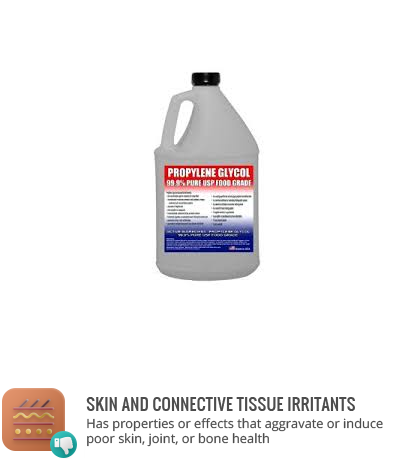Propylene glycol
Definition
Propylene glycol is a slightly sweet liquid used as a flavour carrier, texture enhancer, humectant, and preservative. It is used in “environmentally-friendly” anti-freeze as an alternative to the toxic ethylene glycol, as well as in e-cigarettes and a variety of pharmaceuticals and cosmetics.
Health considerations
Propylene glycol is considered “Generally recognized as safe” by the U.S. FDA. Studies in animals have found: no adverse effects when comprising 8% of dogs’ diets; no carcinogenic effects at levels equating to upwards of 175g a day in the human diet, tested in rats; to cause a slight reduction in growth at 10% of the diet; that mega-dosing spikes insulin, alters hormone balance, and induces ovulation in dairy cows. Propylene glycol in the diet, at normal levels, has been associated with rash and other allergic reactions.
Keep in mind
Propylene glycol breaks down quickly in the body to four compounds, one of which is potentially hazardous but not at levels conceivably attained outside of ingestion of very large quantities; mega-dosing is required to see even minor effects. As an additive, propylene glycol is used in very small quantities.
May be found in
Flavor extracts, ice cream, frozen desserts, soft drinks, sweets
References
Animal Feed Science and Technology
Livestock Science
Food and Cosmetics Toxicology
Food and Cosmetics Toxicology 2
Public Health Statement for Propylene Glycol
Wiley Online Library
Wiley Online Library 2
EPA
Alternative Spellings and Names
1,2-propanediol, propane-1,2-diol, methyl ethyl glycol, methylethylene glycol, E1520


